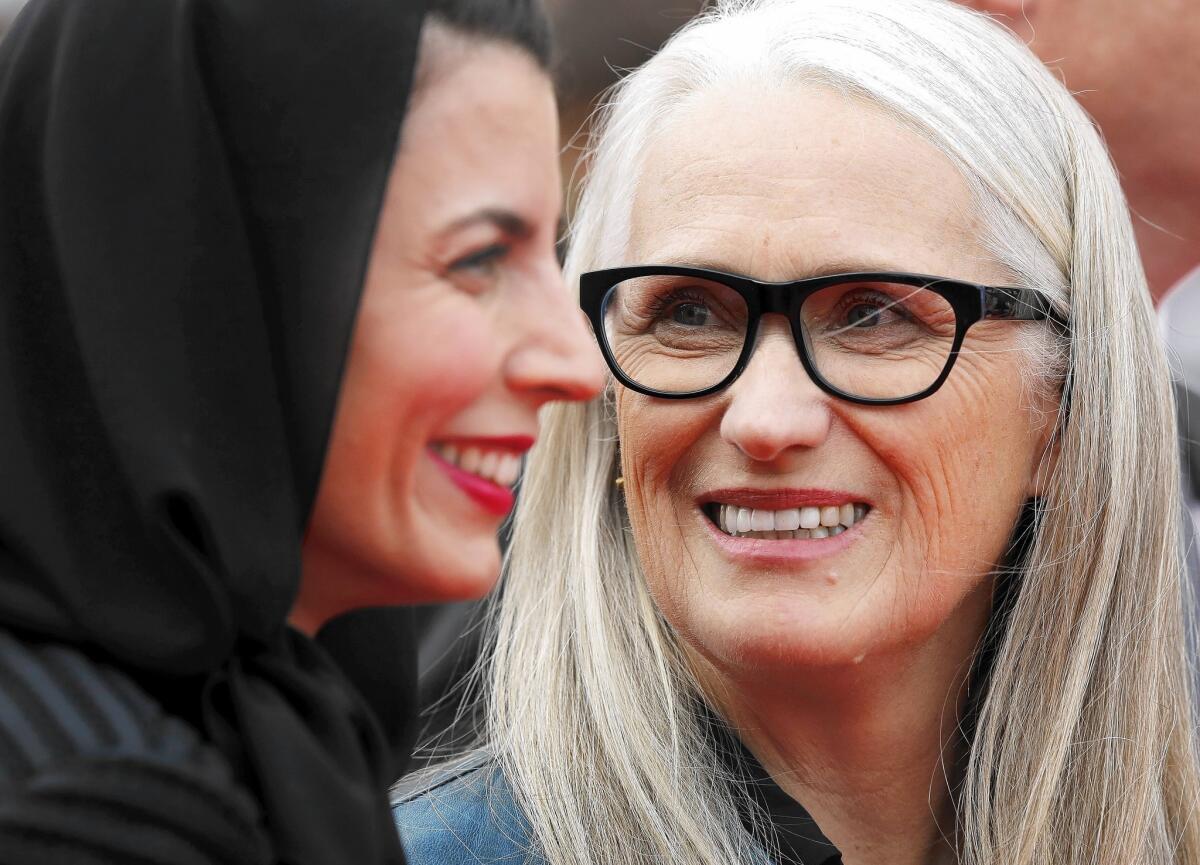Cannes 2014 departs, leaving strong emotions in its wake

- Share via
Reporting from Cannes, France — The Festival de Cannes can be a cold and unforgiving place, where films are sliced, diced and left for dead. But, paradoxically, it can also be an occasion where sincere and unaffected emotions are put on display, and this was very much the case when this year’s awards were handed out.
Turkish director Nuri Bilge Ceylan closed the evening Saturday by winning the Palme d’Or for his “Winter Sleep,” but his brief speech did not hold a candle to some of the acceptances that had come before, most notably Timothy Spall’s. The best actor winner for portraying the painter J.M.W. Turner in writer-director Mike Leigh’s “Mr. Turner,” Spall gave the kind of long and wonderfully rambling speech that would have given Oscar producers fits.
Spall gave special praise to frequent collaborator Leigh, whom, he noted, he’d met 33 years before, just a week before he met his wife. “He taught me the way to honesty in acting,” Spall said. “He taught me to honor the character. This is as much an accolade for Mr. Leigh as for me.” Spall closed with a reference to his battle against leukemia 18 years earlier, saying, “Most of all I thank God I’m here and still alive.”
Earlier in the evening, an equally emotional Samuel Theis was one of three co-directors accepting the Camera d’Or for best first film for the quietly moving “Party Girl,” which screened in the festival’s Un Certain Regard section.
The film relates the drama surrounding a sixtysomething cabaret worker named Angelique who still loves to party and can’t decide if it’s time to give up the high life and marry, a story that was personal to Theis. “My mother is a party girl,” he told the audience, clearly moved. “With this film I tell her story, and now I have the Camera d’Or.”
Two of the awards night’s most memorable moments involved Australian director and jury president Jane Campion. When 83-year-old Gilles Jacob, who is stepping down as president of the festival, came to the podium to present the Camera d’Or, he asked Campion, whose career has been closely linked to the festival since a short film of hers won a prize here in 1986, to stand next to him. “Jane,” he said quietly, “you know what you mean to me.”
A short while later, when Canadian director Xavier Dolan accepted the jury prize his “Mommy” shared with Jean-Luc Godard’s “Goodbye to Language,” he addressed Campion directly as well.
“No film changed my life the way ‘The Piano’ did,” he told the director. “It made me want to write roles for women, beautiful roles with soul and will and strength. Not victims, not objects.”
Though most of the focus in Cannes is on the productions in competition, some of the best films here are not in it. Two fine items turned up in the Midnight section, including the brisk “Target,” a Korean remake of the French crime drama “Point Blank,” and one film that was strong enough to be in competition but wasn’t asked, David Michôd’s “The Rover.”
Michôd’s first film since “Animal Kingdom,” this impressive, bleakly futuristic thriller features Guy Pearce as a man ferociously determined to get his stolen car back and Robert Pattinson as someone dragged along in his wake.
Aside from “Party Girl,” three of Cannes’ most talked about films were in the Un Certain Regard section, including “White God,” a pulpy examination of dogs in revolt against men by Hungarian director Kórnel Mundruczó.
One of the most provocative films in the section and in Cannes overall was Swedish director Ruben Östlund’s “Force Majeure.” Psychologically shrewd with a biting comic edge, this tightly made drama shows what happens to a family on a skiing vacation when the father flees an impending avalanche rather than staying to protect his children.
Also in Un Certain Regard was “The Salt of the Earth,” a superb documentary on Sebastião Salgado co-directed by Wim Wenders and the photographer’s son, Juliano Ribeiro Salgado. No matter how much or how little you know about this celebrated creator of images, this film will be a revelation.
This year’s Cannes was overall a better than average year for documentaries. Other engaging examples include “National Gallery,” veteran Frederick Wiseman’s look at the British art institution; “Les Gens du Monde,” an involving examination of how journalism works at the French daily Le Monde; and “The Go-Go Boys: The Inside Story of Cannon Films,” a genial portrait of the days when Israeli cousins Menahem Golan and Yoram Globus were unavoidable presences in the international film world.
“If you love the movies, you have to give yourself to the movies and forget your other life,” Golan says at one point. “Kill your aunt, steal her money, make your movie.”
He didn’t seem to be completely serious, but at Cannes one never knows.
More to Read
Only good movies
Get the Indie Focus newsletter, Mark Olsen's weekly guide to the world of cinema.
You may occasionally receive promotional content from the Los Angeles Times.










